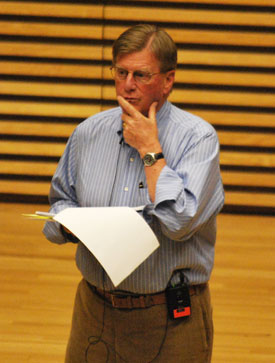The Power of Entrepreneurs

Phil Power talks to UM students on Friday afternoon as part of the MPowered lecture series on entrepreneurship.
Here’s what Phil Power believes: “There is nothing in life that is more challenging or more of an art form than being an entrepreneur.”
The former UM regent and newspaper publisher was talking to a group of University of Michigan students on Friday afternoon, giving them some insights on his own experiences founding Hometown Communications Network as well as his newest venture in social entrepreneurism, the Ann Arbor-based Center for Michigan. His talk was part of a series hosted by MPowered, a student entrepreneur group.
Power said he’d read Friday’s Detroit News article reporting that more than half of UM’s graduates leave the state after graduation. People have told him there’s nothing here for them in Michigan, he said, “which I think is a load of bull.”
This state is a great place for entrepreneurs, Power said, in large part because major market discontinuities (which he defined as “when things are really screwed up”) are creating opportunities. “Michigan is a perfect example today of wholesale market discontinuity,” he said, specifically in the auto and newspaper industries.
Michigan also has a rich history of inventive ideas spawning business ventures, he said, much of it occurring at the turn of the last century. Dow, Upjohn, Kellogg, Ford and Hudson’s are the most high-profile examples – each started small and grew into major corporations. “Entrepreneurship DNA is in our bones,” Power said.
Social entrepreneurship, too, has a history in this state, he said. Back in the 1960s, UM graduate students Alan and Judith Guskin founded the group Americans Committed to World Responsibility, which Power joined. He was also editor of the Michigan Daily at the time, and published a letter the Guskins wrote that called on other students to join them in serving abroad for their country, Power said. The letter was picked up by other media, and eventually made its way back to John F. Kennedy, who was running for president. Power said this ultimately led Kennedy to establish the Peace Corps after he was elected.
The point of his story, Power said, was not to talk about what limited role he played in this chain of events, but rather to show that “in social entrepreneurship, nothing is more powerful than a bright idea whose time has come.”

Students await the start of Phil Power's talk on Friday at the Stamps Auditorium on UM's North Campus.
Power sees himself as a social entrepreneur. In 2004 he sold his chain of newspapers, which serve suburban markets, to Gannett – noting that this was just prior to the industry’s collapse, and “it is much, much better to be lucky than smart.” A Democrat, he said he was disturbed by increasingly fractious partisan politics in Lansing, and told his wife, “I will be goddamned if we move to Florida and let the sand flow between our toes while our state goes to hell.”
So he founded the Center for Michigan as a bipartisan effort to develop and advocate for policy changes, pressing both political parties to move toward the center. He said he has no interest in forming a third party or running for governor – “if I did, my wife would slit my throat” – but believes the center can be instrumental in finding solutions without being bound by ideological strictures.
He describes the center as a “think and do tank,” because thinking without doing is pointless, and “as the mayor of Detroit has discovered, doing without thinking gets you into a great deal of trouble.” The group began by hosting a series of conferences focused on specific topics, including tax reform and human investment. Power said an example of human investment is the Kalamazoo Promise, a program that pays tuition to state colleges and universities for any Kalamazoo resident who graduates from high school.
The next step was to start doing, Power said, and the center did that by starting community conversations, holding small group meetings around the state to discuss the vision for Michigan, and strategies for achieving that vision. The idea is to create a citizens movement from the ground up, developing common ground and common sense solutions, he said. They held 180 of these meetings in 2007 and 2008, engaging 2,000 people. From those discussions they compiled and published a document – Michigan’s Defining Moment – which is also the name of the center’s broader effort to push for change.
They’re holding additional community conversations over the next year or so, and plan to create action groups around topics that participants identify as priorities. The effort also involves developing policies and lobbying lawmakers in Lansing to enact legislative changes based on these policy recommendations.
The 2010 elections will be a watershed moment, Power said, as term limits will result in a massive change of power in Lansing. Michigan is at a hinge in its history, he said. The state can unify around a shared vision for its future, “or we can be Mississippi with cold weather,” he said. “I believe the choice is relatively simple.”



